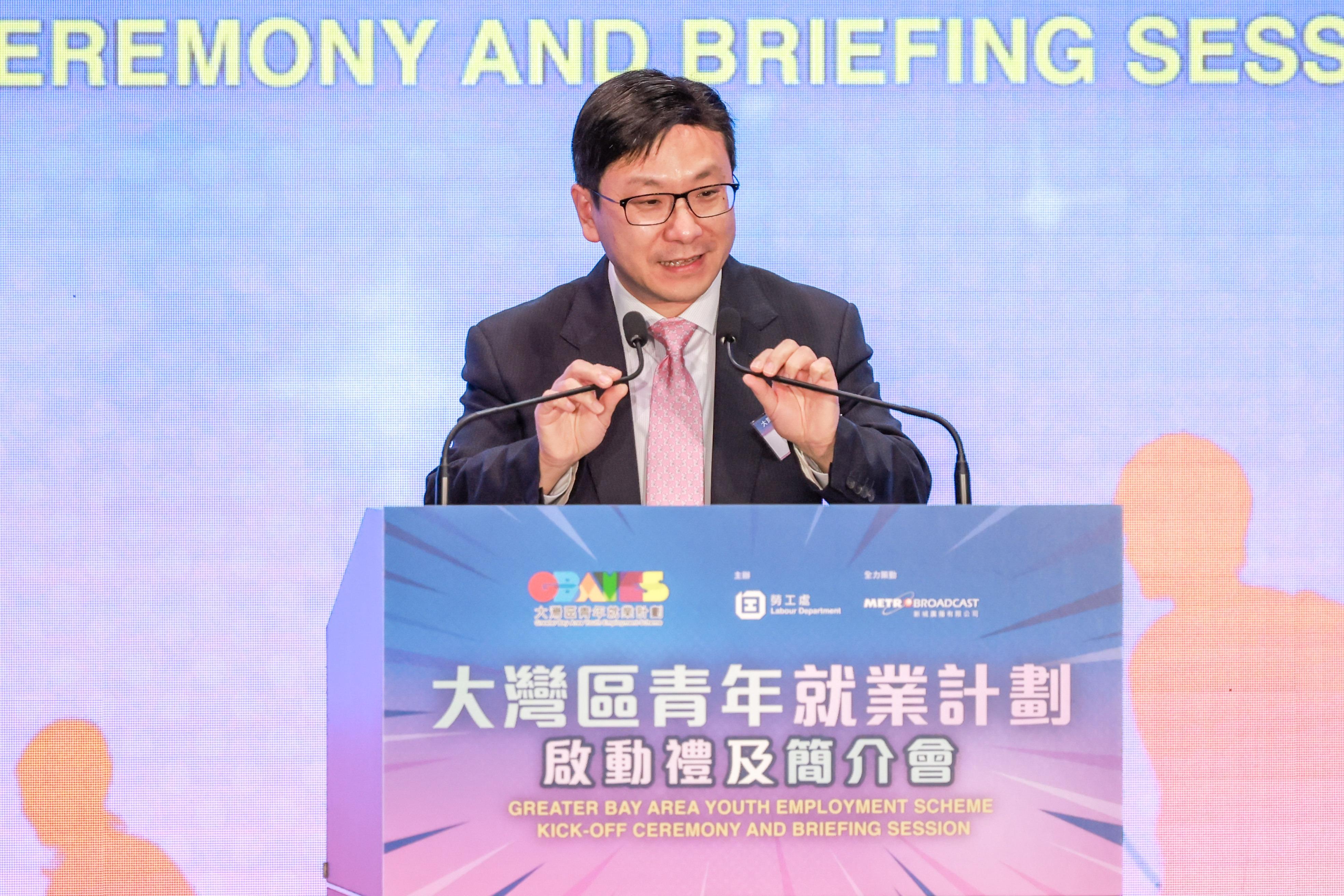 Secretary for Labour and Welfare Chris Sun Yuk-han gives a speech during the Greater Bay Area Youth Employment Scheme Kick-off Ceremony cum Briefing Session, at the Hong Kong Convention & Exhibition Centre, in Wan Chai, on March 30, 2023. (ANDY CHONG / CHINA DAILY)
Secretary for Labour and Welfare Chris Sun Yuk-han gives a speech during the Greater Bay Area Youth Employment Scheme Kick-off Ceremony cum Briefing Session, at the Hong Kong Convention & Exhibition Centre, in Wan Chai, on March 30, 2023. (ANDY CHONG / CHINA DAILY)
The Enhanced Supplementary Labour Scheme, which allows recruiters from 26 job categories to hire overseas workers to ease the labor shortage, started accepting applications from Monday. Industry insiders revealed that local recruiters are actively preparing for an influx of applications, and called for measures to better protect the benefits of overseas and local workers.
To relieve the city’s severe labor shortage, the Hong Kong government announced in June it was launching specific labor importation schemes for the construction and transport sectors, and that it would lift the worker import ban on 26 job categories for two years.
Secretary for Labour and Welfare Chris Sun Yuk-han said on Sunday that the authorities will endeavor to approve applications within three months
The posts include hairdressers, salespersons, cashiers, waiters/waitresses, junior cooks, washers, warehouse keepers, delivery workers and demolition workers.
As with the other labor importation schemes, the government has given its approval for these industries to apply to import labor only after they have proved that local recruitment is not feasible, and it has stipulated that the wages for imported workers must be no less than the median monthly wages of local workers in comparable positions.
ALSO READ: FTU proposes ways to end labor import when economy slows
The duration of the employment contract for a worker imported under the enhanced scheme can be no longer than 24 months.
Secretary for Labour and Welfare Chris Sun Yuk-han said on Sunday that the authorities will endeavor to approve applications within three months.
He also mentioned that applications for importing labor to fill certain low-skilled or non-technical vacancies will be reviewed and monitored by senior staff members of the Labour and Welfare Department, and the whole scheme would be reviewed later.
Stressing the principle of prioritizing local employment, Sun pointed out that the proportion of imported workers in the city’s overall labor force is less than 1 percent, indicating that their presence will have a minimal impact on the local market.
ALSO READ: Labor import: 2,841 applications for HK aviation jobs okayed
He said that the development of various industries is constrained by a shortage of manpower, and emphasized that the scheme requires employers to conduct four weeks of local recruitment before importing overseas workers.
During this period, the Labour and Welfare Department will approach different parties to review the recruitment situation and assess whether the employer has genuinely attempted to hire local employees.
The department will also contact relevant trade unions to understand the employer's background and communicate with job applicants to ensure the employer has adhered to the principles for importing supplementary labor.
Caspar Tsui Ying-wai, the executive director of the Federation of Hong Kong Hotel Owners, said the industry is facing an extreme shortage of manpower, which has seriously affected local hotels’ reception capacity
Caspar Tsui Ying-wai, the executive director of the Federation of Hong Kong Hotel Owners, said the industry is facing an extreme shortage of manpower, which has seriously affected local hotels’ reception capacity.
He estimates an overall shortage of 9,000 workers in the industry, primarily in housekeeping, food and beverage service, and front desk receptionist positions. Due to the higher costs of hiring overseas workers, the sector is initially hoping to apply to import 2,000 workers, with each job category accounting for around 30 percent.
ALSO READ: Hong Kong to import 20,000 workers to ease labor woes
Tsui added that the arrangements for accommodation for and training of imported labor have not been decided yet. Many recruiters are considering arranging for workers to reside on the Chinese mainland, which provides greater flexibility. Additionally, training will be arranged in the hope that imported workers’ performance can meet Hong Kong standards.
According to Shiu Ka-fai, a lawmaker representing the wholesale and retail sector, the industry is facing a shortage of approximately 30,000 to 40,000 employees, including salespersons, warehouse workers, clerks, and computer technicians.
Many employers have expressed a desire to submit applications to supplement their workforce. Shiu said that the industry is in agreement over prioritizing the hiring of local workers. Only when local recruitment is not possible will the industry consider applying for imported labor.
In terms of the application mechanism for importing labor, lawmaker Michael Luk Chung-hung from the Hong Kong Federation of Trade Unions told China Daily that preventing the abuse of labor importation schemes — for example, preventing employers from setting unreasonable recruitment requirements and then pretending they can’t find local workers — is essential. He emphasized that the Labour and Welfare Department must carefully consider how to regulate this aspect effectively.
READ MORE: Labor import: CE stresses ‘bigger pie’ for economic benefits
Luk pointed out that there have been cases of imported workers’ wages being withheld; he hopes that imported workers can be better educated on how to protect their benefits, and called on the authorities to punish violations harming the workers’ interests, and to encourage workers facing such problems to actively seek help from government departments.
Regarding developments with applications for other importation schemes, the scheme for light bus/coach drivers, through which employers are seeking to import about 1,600 drivers, received 118 applications in the first round.
The scheme for the aviation industry has so far approved applications from 28 companies, with a total of 2,841 aviation workers’ applications approved, accounting for 45 percent of the quota ceiling of 6,300.
The first stage of the construction sector’s labor import scheme received 26 applications, involving 5,251 workers.


